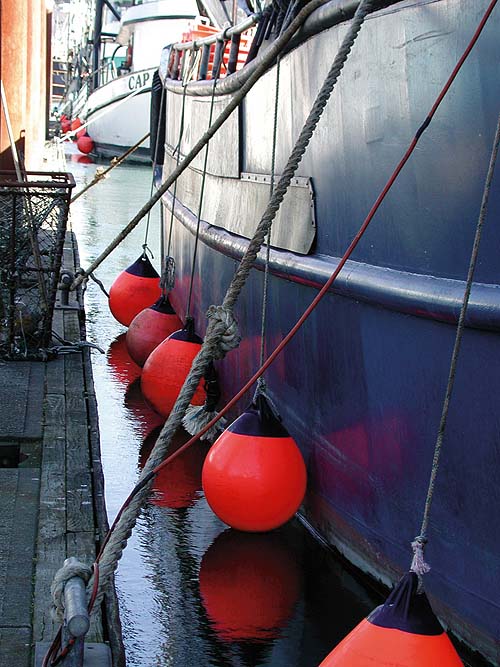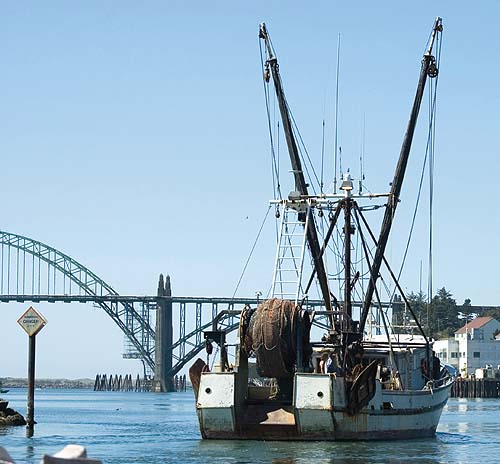 A new plan that will drastically change how trawl fishermen operate off the coasts of Oregon, Washington and California is heading toward implementation in January after seven years of debate, discussion and hundreds of meetings.
A new plan that will drastically change how trawl fishermen operate off the coasts of Oregon, Washington and California is heading toward implementation in January after seven years of debate, discussion and hundreds of meetings.
 |
Newport’s trawl fishermen and those along the entire U.S. West Coast will be affected by new regulations regarding groundfish proposed by the Pacific Fishery Management Council. The National Marine Fisheries Service will review the council’s plan and recommend to the Secretary of Commerce whether to approve the program. |
A new plan that will drastically change how trawl fishermen operate off the coasts of Oregon, Washington and California is heading toward implementation in January after seven years of debate, discussion and hundreds of meetings.
The Pacific Fishery Management Council, which regulates over 90 species of groundfish with an estimated annual value of $61 million, two years ago adopted a system of individual fishing quotas (IFQs) for the Pacific Coast groundfish trawl fishery along with a system of structured harvest co-operatives for the at-sea whiting fishery. The final environmental impact statement on the program was released in late June and the council expects finalization of the process by January.
The so-called trawl rationalization program is under Amendment 20 and 21 of the Pacific Coast Groundfish Fishery Management Plan. The council proposed the changes to “help increase economic efficiency, reduce excess capacity in the fishery, reduce the bycatch of overfished groundfish and Pacific halibut, create more individual accountability for harvest among participating fishermen, provide fishermen with more flexibility in their business operations, and reduce ecological impacts.”
An IFQ is a federal permit to harvest a given quantity of a particular species of fish. Right now, the West Coast trawl fishery is managed by a system of fleetwide two-month cumulative landing limits and other restrictions.
About 140 trawl vessels operate out of ports in Oregon, Washington and California.
 |
“There is an illusion that the status quo is really good,” says Brad Pettinger, director of the industry-funded Oregon Trawl Commission (OTC). “One reason for the quotas is to eliminate bycatch. Basically, you don’t throw fish away any more. For the most part, if we don’t do something, we will get restrained more, and the groundfish could be restrained far more than they are now.” IFQs introduce harvester accountability into the fishery management system and provide incentives to reduce catch of protected species.
“Right now, everyone has the same limit,” says Pettinger. “There’s 50 to 60 species managed. During a two-month period, you’re hitting up against those limits placed on the fleet. So there is discord year-round. The new system gives fishermen their entire allocation of fish upfront. If you go over your limit, instead of throwing it away, you can sell it or trade it. Quotas are meant to be good stewards of the resource. Throwing away good fish is bad.”
Among those concerned about the quotas is the Newport Shrimp Producers group. Spokesman Nick Edwards, a shrimper based in Coos Bay, says that the largest spillover effect from quotas will be in the Oregon pink shrimp fishery. He says that the shrimp fishery has averaged 46 vessels per year and there are 141 eligible permits; quotas will force additional trawl vessels into an “already over-capitalized” shrimp fishery. He says there is no longer the processing infrastructure for the fleet to double in size.
But Fred Yeck of Seadawn Fisheries in Newport in a letter to the OTC in July urged support of the quotas. “Once fishermen have [IFQs], then fishermen will be in control rather than the processor … There is concern there won’t be enough bycatch for fishermen to harvest their target species. However, the [program] does not reduce the overall amount of bycatch, it simply divides it up and then distributes it to individual fishermen. This does not threaten fishermen, it simply puts them in charge of their own destiny.”


